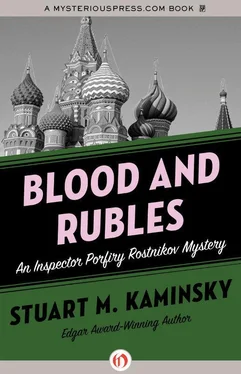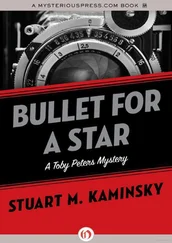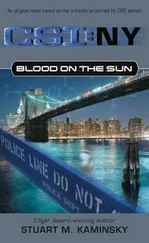Stuart Kaminsky - Blood and Rubles
Здесь есть возможность читать онлайн «Stuart Kaminsky - Blood and Rubles» весь текст электронной книги совершенно бесплатно (целиком полную версию без сокращений). В некоторых случаях можно слушать аудио, скачать через торрент в формате fb2 и присутствует краткое содержание. Год выпуска: 2012, Жанр: Полицейский детектив, на английском языке. Описание произведения, (предисловие) а так же отзывы посетителей доступны на портале библиотеки ЛибКат.
- Название:Blood and Rubles
- Автор:
- Жанр:
- Год:2012
- ISBN:нет данных
- Рейтинг книги:3 / 5. Голосов: 1
-
Избранное:Добавить в избранное
- Отзывы:
-
Ваша оценка:
- 60
- 1
- 2
- 3
- 4
- 5
Blood and Rubles: краткое содержание, описание и аннотация
Предлагаем к чтению аннотацию, описание, краткое содержание или предисловие (зависит от того, что написал сам автор книги «Blood and Rubles»). Если вы не нашли необходимую информацию о книге — напишите в комментариях, мы постараемся отыскать её.
Blood and Rubles — читать онлайн бесплатно полную книгу (весь текст) целиком
Ниже представлен текст книги, разбитый по страницам. Система сохранения места последней прочитанной страницы, позволяет с удобством читать онлайн бесплатно книгу «Blood and Rubles», без необходимости каждый раз заново искать на чём Вы остановились. Поставьте закладку, и сможете в любой момент перейти на страницу, на которой закончили чтение.
Интервал:
Закладка:
“No,” said Paulinin. “I looked at the corpse when they were done with him. I closed his eyes. On one lid was written ‘Do not wake me.’ On the other was his name, Mikhail Sivak. The other one had no name tattooed on his body.”
“This eagle on his right buttock, the one carrying the bomb?” Karpo asked.
Paulinin was up now, lifting bottles, opening boxes-searching for something.
“The bomb and eagle is recent,” Paulinin said. “It suggests that he now deals in powerful weapons. The artist who did this tattoo was especially precise, definitely an artist. The bomb is an exact replica of a hydrogen bomb. I expect I’ll be seeing more of these in the future.”
“You said you had a surprise for me,” said Karpo. “Was that it, the trade in nuclear weapons?”
“No … here,” said Paulinin, finding what he was looking for. “I knew it couldn’t be far.”
He held up something that looked like a small painting, a replica of the eagle and bomb that was tattooed on the head of Mikhail Sivak. The painting was sandwiched inside two sheets of glass. Paulinin handed the treasure to Karpo.
“I took it from his body,” said Paulinin. “Scalped him like one of those American Indians. Such art deserves to be preserved.”
“May I keep this?” Karpo asked.
“A gift from me,” said Paulinin with some pride.
The pressed, colorful skin of Mikhail Sivak fit tightly into Karpo’s jacket pocket.
“Questions,” said Karpo.
Paulinin waved an arm to show that he was prepared.
“What can you tell me about the dead man at the table with the woman?”
Paulinin paused in his fussing over the box from which he had taken the patch of Mikhail Sivak’s skin. “The bullets from his weapon killed the two tattooed men in the street. He must have been a good shot to use a handgun against people who knew how to use automatic weapons. Our man with the four-fifty-four Casull was, as you know from looking at his wallet, a German. Heinz Dieter Kirst. He and the woman were both killed by the same weapon, instantly. The bald man must have been firing after he died. The man and woman were killed by a dead man.”
Paulinin pointed to a spot on his right temple to indicate where the bullet had entered and exited the German.
“The dead waiter was named Waclaw Wypich,” Paulinin said. “A Pole who-”
“I know,” said Karpo.
The other two, the ones without identification, wore blue Adidas sweat suits and leather jackets. Both had light-colored, recently barbered hair. Both appeared to be in their late twenties or early thirties.
“Can you tell me anything about the German?”
“Interesting question,” said Paulinin, holding up half a cookie he had unearthed from his boxes. It was wrapped in a see-through bag. Karpo showed no interest in the cookie, so Paulinin opened the bag and began eating it as he continued. “Judging from the fact that he was carrying a gun and knew how to use it, I would say that the tattoos had come to kill him, and he half expected it. My guess is that the woman, whom I examined, was a prostitute, and the German was negotiating with her.”
Karpo had already come to this conclusion. What he hadn’t been prepared for was Paulinin’s simple statement that he had examined Mathilde’s dead body.
“Treachery,” said Paulinin, taking a bite of his cookie after dipping it into his tea. He did not notice that Karpo had closed his eyes. “Who knows? German promises something and then fails to deliver. Our tattooed mafia think the German has betrayed them or made a deal for whatever he is selling or buying with someone else. Who knows? That’s your job.”
Karpo opened his eyes.
“Yes,” he said.
“What am I?” asked Paulinin, wiping the crumbs off his hands on his smock. “A grub of a scientist with almost no budget and certainly no bloated reputation like Rostov or Kelenin or … or any of them. They fired their automatic weapons at Kirst, not concerned about who else might get shot. Kirst fired back, killing them. A pair of innocent bystanders got in the way. Someone was waiting for our killers to do the job. When they were both killed, whoever was waiting saw no reason to stay, and off he went.”
To illustrate the car’s driving away, Paulinin rolled what was left of his cookie across the papers on his desk.
Karpo looked down at the rolling cookie. Paulinin was simply talking now, presenting nothing Karpo himself hadn’t immediately determined at the crime scene. He willed himself to see Mathilde’s face, but he could not.
Paulinin sat down at his desk and popped the rest of the cookie into his mouth. “And now?” he said.
“We are most likely dealing with a mafia of ex-prisoners who are dealing in the sale of nuclear weapons to foreigners. I will find the leader of this mafia. I will find whoever ordered these murders.”
And when I find him, Karpo thought, I will kill him.
“I brought American peanut-butter sandwiches for lunch,” said Paulinin, moving to a refrigerator behind his desk.
He opened the door to the refrigerator. Karpo could see jars of specimens and a lone cloth bag. Paulinin pulled out the bag, closed the refrigerator door, and turned to Karpo.
“Plenty for both of us,” said Paulinin. “And I have Pepsi-Colas.”
“Yes,” said Karpo.
Paulinin smiled and handed a sandwich wrapped in frequently used aluminum foil to Karpo, who hoped that the food would ease his growing nausea.
FOUR
Besides the storeroom of treasures, the kitchen was the largest room in Ivan Dokorov’s house. It now held sixteen people, two of them women. The two women were Elena Timofeyeva and Natalya Valorovna Dokorova, the sister of the deceased man who had amassed the now-missing treasure.
The men crowded around the old woman, who sat at the kitchen table, hands folded, a distinct look of determination on her face. She did not move her head but turned her eyes in the direction of whoever spoke the loudest.
“How long had your brother been accumulating his collection?” someone shouted.
Natalya shrugged.
This was no criminal investigation. It was a madhouse in which no one knew who was in charge.
There were representatives from two separate police districts, both of which claimed, under Yeltsin’s redistricting plan, that they were responsible for the investigation. There were three members of the tax police, none in uniform, claiming loudly that this was a tax case. There were members of the State Security Department, which had gone through so many changes that even they were not sure of their jurisdiction, but they were certain that they were the elite in the room. The State Security Department was a child of the former KGB, the Komitet Gosudarstavennoy Bezopasnosti, or Committee for State Security. Following the coup that brought democracy, capitalism, and an explosion of crime and corruption the Second Directorate of the KGB, the section responsible for counterintelligence, had been merged with the Sixth Directorate, which was responsible for economic crimes. The new department, reporting directly to the presidium and the president, was to focus on fraud and corruption. All these agencies wanted to be in on the treasure hunt.
“Is there some way out of this building other than through the front door and the rear door?” came another voice.
Natalya shook her head.
Elena had tried, without success, to push forward through the crowd of elbows and suited men. Now she stood with her back to the sink wondering what temporary disease had so deranged Rostnikov and Colonel Snitkonoy that they had assigned her to this important case.
“Who do you think took the collection?”
Читать дальшеИнтервал:
Закладка:
Похожие книги на «Blood and Rubles»
Представляем Вашему вниманию похожие книги на «Blood and Rubles» списком для выбора. Мы отобрали схожую по названию и смыслу литературу в надежде предоставить читателям больше вариантов отыскать новые, интересные, ещё непрочитанные произведения.
Обсуждение, отзывы о книге «Blood and Rubles» и просто собственные мнения читателей. Оставьте ваши комментарии, напишите, что Вы думаете о произведении, его смысле или главных героях. Укажите что конкретно понравилось, а что нет, и почему Вы так считаете.












